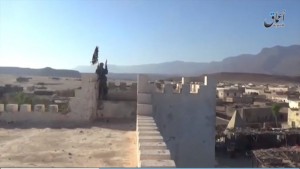Forces loyal to the Islamic State withdrew from the northeastern Somalian town of Qandala yesterday, just one day after capturing it. The town, which is in the autonomous Puntland Region, fell on Oct. 26 after a brief firefight with the jihadists and local Puntland forces left the city.
The BBC reported yesterday that residents told a local news outlet that the militants have left the town. Puntland forces also reportedly launched a counter-attack against the group, but it is unclear if that is why the jihadists withdrew. The leader of the Islamic State branch in Somalia, Abdulqadir Mumin, was seen in the city and held talks with local elders.
On Wednesday, Amaq News Agency, the Islamic State’s news outlet, claimed control over the town in a short statement released online. A local official from Puntland, said in an audio statement that the town had indeed fallen after the Puntland troops were forced to retreat. The capture of Qandala marked the first time the small Islamic State branch captured any meaningful territory in Somalia. [See LWJ report, Islamic State in Somalia claims capture of port town.]
To provide visual evidence of this claim, Amaq also released a short video clip from Qandala, showing the jihadist forces moving into the city and raising their flags in different areas of the town. Only a few fighters were seen in the video, however, it is possible that more were involved in the earlier fighting but not shown on camera.
Compared to Shabaab, the official al Qaeda branch and its main rival in the country, the Islamic State’s branch in Somalia is known to be relatively small. The Wall Street Journal estimated yesterday that the Islamic State in Somalia only has a “few hundred” fighters in its ranks. When it first formed one year ago, it was initially reported that only 20 of the 300 Shabaab fighters based in Puntland joined. But, in the US State Department’s designation of Abdulqadir Mumin as a global terrorist, State noted that Mumin “expanded his cell of Islamic State supporters by kidnapping young boys aged 10 to 15, indoctrinating them, and forcing them to take up militant activity.” [See LWJ report, US adds Islamic State commander in Somalia to list of global terrorists.]
With its capture of Qandala yesterday, the fledgling Islamic State branch demonstrated that it has the capabilities to even capture territory, however temporary. It also gained significant media attention, which fits into and helps the overall Islamic State messaging to deflect the attention away from losses and preserve the idea of its expansion and global territorial control. This is especially true in the face of defeats near Mosul, its largest remaining stronghold in Iraq.
longwarjournal.org



